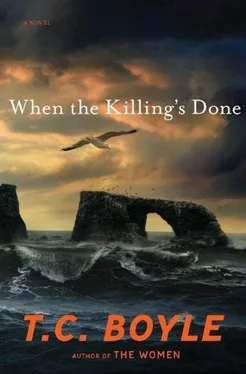“Okay,” Annabelle says, flashing a smile, “we can all agree with that — but what do you mean?”
“What we do is trap as many as we can and hope to find a couple females in estrus — these things’ll breed all year round in this climate, so it’s not so hard as you might think, especially if you cage a boar with them for a day or two. Then we radio-collar the females and let them go.” He’s leaning so far over the table he’s practically in her lap at this point and Alma has to remind herself, while sitting rigid and fighting down the gas pains, that it doesn’t really matter to her one way or the other if he finds a little solace wherever he can. “And you’d be surprised,” he says, “or maybe not, maybe it’s just what you’d figure. But each of those females will wind up with a whole parade of boars around her, rooting and fighting and sniffing her up — even the wiliest old scarred-up paranoid razorback’ll come charging up out of his hole for a chance at that — and it can bring in a whole bloody contingent of sows and juveniles too, whether they’re in heat or not, just to be close to the action. Like a pig disco.”
“And then?”
“Then we track them and move in.”
He pauses to take a sip of coffee, all three of them playing that scenario over in their heads, the abrasive hides, the mobile snouts, pig sex. “And believe me,” he says, “nobody gets out alive.”
Afterward, after she’s put the bill on her card and said her goodbyes all around, she finds herself in the deserted ladies’ room, the light of ten o’clock in the morning suffusing the high glass-block windows. She should be at work. And she will be, she promises herself, in just a minute — she’ll leave the car where it is and walk so she can get a little sun on her face and steal a march on the protestors, blending with the tourists and slipping in the service entrance before they even know she’s there — but for the moment she just needs to clear her head. And breathe, breathe as deeply as she can. The pain in her abdomen hasn’t gone away — in fact, it seems worse, as if she’s swallowed some sort of corrosive, Drano, Emma Bovary’s strychnine, brodifacoum. The image of a rat flits through her head, its feet churning, eyes fixed. It’s the coffee, it has to be. And the oatmeal. Whatever possessed her to order oatmeal? She should have stuck to toast, dry toast, but then the thought of it — brittle, abrasive, crushed and wadded and stuck in her throat — sends her banging into the stall and suddenly everything’s coming up, the coffee, the oatmeal, the dregs of her mother’s pasta and the thinnest disembodied hint of Onikoroshi sake , too much sake , formerly on the rocks.
Immediately she feels better. She flushes twice, watching the water swirl in the bowl, but the smell lingers even as the outer door wheezes open and footsteps approach in a sharp high-heeled tattoo. Her first thought is of Annabelle, but that can’t be because she watched her go down the steps in animated conversation with Frazier ten minutes ago. At least. The heels tap closer and she freezes while the handle of the stall briefly rattles and whoever it is pulls back the door of the adjoining stall and settles in with a sigh, followed by a fierce hissing rush of urine. Then she’s out of the stall and at the sink, cupping her hands for a sip of water to rinse her mouth, wishing she had a toothbrush — or breath mints; she makes a note to stop in the place downstairs to pick some up — and though she’d like to take a minute with her lipstick and hair, she doesn’t dare because the occupant of the other stall is noisily unraveling toilet paper and she doesn’t want to be seen. Not now. Not after being sick. So she’s out the door and down the stairs, thinking to freshen up in the restroom at the office, thinking she’ll get herself a Coke and maybe a package of crackers to settle her stomach. And the breath mints, definitely the breath mints.
Just below the restaurant, on the promenade that wraps around the marina, there’s a shop that caters to tourists and carries the usual cornucopia of things, from Dramamine, sunblock and cheap straw hats for the whale-watching crowd, to postcards, T-shirts and bobble-head dolls for the landlubbers, to the soft drinks, hot coffee, prepackaged sandwiches, crackers and cheese in the shrink-wrapped single-serving portion, breath mints, candy and tabloid magazines everybody needs all the time. She’s about to duck in the door — a drift of metallic balloons in a stand there, artificial poppies sprouting from a styrene ball in a papery blaze of red, T-shirts clothespinned to a wire like wash — when she catches herself. There’s a young woman, a girl, seated at one of the white plastic tables out front, her back to Alma, and her hair — dyed a uniform copper red — trailing down her back in a spill of trained curls. But isn’t it Alicia? Alicia doing what, taking her lunch break? She checks her watch. At ten-thirty in the morning?
Before she can think what to do — Is it Alicia? Is she really prepared to question her, discipline her, wonder why she’s not at her desk in the absence of her boss, opening the mail, answering the phone, for God’s sake? — the light shifts as if someone’s put a hand over the shutter of a lens and a man comes backing out the door, a cardboard tray with two cups of coffee and a package of powdered doughnuts held out gingerly before him. But she knows him, doesn’t she? The earring, the goatee, the incongruous shock of the blue eyes in a Latino’s face, or part Latino, Chicano, mestizo, whatever you call it, and who—?
And it comes clear. Because he recognizes her in that instant and in that instant she knows him, knows him in a flash of recollection, even as Alicia turns her head to look over her shoulder to see what’s keeping him. Alicia, her features gone slack and her eyes retreating. Alicia, shrinking. Alicia revealed. But he — Wilson, that’s his name, Wilson — he’s unfazed. He saunters up to the table, sets the tray down, and looks back to where Alma stands arrested at the door to the shop in which her Coca-Cola Regular, cheese and cracker combination and breath mints await. Then, so casually he might have been posing for a snapshot, he flashes her a smile — a beautiful, full-lipped, effervescent smile, as if they’re the best friends in the world — and slowly pulls up the chair beside Alicia, puts an arm around her shoulders, and draws her to him.
H e’s at home, glancing up from the morning paper in what he likes to call the sunroom to look out the window on the crew he’s hired to lay sod over the desiccated remnant of the lawn. The whole operation has him conflicted — lawns are bad news for the environment, yes, but he’s got to keep up property values, or his property’s value anyway, and he did turn down two contractors who wanted to go the herbicide route in favor of this crew, amigos of Wilson, who dug everything up and then laid down plastic sheeting to stifle the weeds — but the bottom line is that the old lawn, the one he inherited when he bought the place back in 1993, was looking pretty ratty. Now, with the sod — and they’ve already rolled out two long dense sections of it, like carpet — he’ll have a deep blue-green Kentucky-perfect lawn right out of one of those glossy magazines, and he won’t have to wait for it to grow in either. And it’s not a question of vanity or keeping up with the neighbors or anything like that — it’s about protecting your investment, because this house is the best investment he’s ever made, a Spanish mission-style beauty situated on a hill, two stories high with carved wooden beams in the main rooms and intricate wrought-iron grillwork everywhere you look, nearly five thousand square feet of living space set on an acre and a half, and now, twelve years after he bought it, worth four times what he paid. He couldn’t have done any better investing in a gold mine.
Читать дальше












